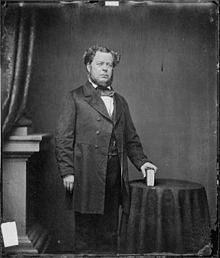
Back ستيفن مالوري Arabic ستيفن مالورى ARZ استیون مالوری AZB Stephen Mallory Catalan Stephen Russell Mallory senior German استیون مالوری Persian Stephen Mallory French סטיבן מלורי HE Stephen Mallory Hungarian Stephen Mallory ID
Stephen Mallory | |
|---|---|
 | |
| Confederate States Secretary of the Navy | |
| In office March 4, 1861 – May 2, 1865 | |
| President | Jefferson Davis |
| Preceded by | Position established |
| Succeeded by | Position abolished |
| United States Senator from Florida | |
| In office March 4, 1851 – January 21, 1861 | |
| Preceded by | David Yulee |
| Succeeded by | Adonijah Welch |
| Personal details | |
| Born | 1812 Trinidad, British West Indies (now Trinidad and Tobago) |
| Died | November 9, 1873 (aged 60–61) Pensacola, Florida |
| Political party | Democratic |
| Spouse | Angela Sylvania Moreno |
| Signature |  |

Stephen Russell Mallory (1812 – November 9, 1873) was a Democratic senator from Florida from 1851 to the secession of his home state and the outbreak of the American Civil War. For much of that period, he was chairman of the Committee on Naval Affairs. It was a time of rapid naval reform, and he insisted that the ships of the U.S. Navy should be as capable as those of Britain and France, the foremost navies in the world at that time. He also wrote a bill and guided it through Congress to provide for compulsory retirement of officers who did not meet the standards of the profession.
Although he was not a leader in the secession movement, Mallory followed his state out of the Union. When the Confederate States of America was formed, he was named Secretary of the Navy in the administration of President Jefferson Davis. He held the position throughout the existence of the Confederacy. Because of indifference to naval matters by most others in the Confederacy, Mallory was able to shape the Confederate Navy according to the principles he had learned while serving in the U.S. Senate. Some of his ideas, such as the incorporation of armor into warship construction, were quite successful and became standard in navies around the world. On the other hand, the navy was often handicapped by administrative ineptitude in the Navy Department. During the war, he was weakened politically by a Congressional investigation into the Navy Department for its failure in defense of New Orleans. After months of taking testimony, the investigating committee concluded that it had no evidence of wrongdoing on his part.
Mallory resigned after the Confederate government had fled from Richmond at the end of the war, and he and several of his colleagues in the cabinet were imprisoned and charged with treason. After more than a year in prison, the public mood had softened, and he was granted parole by President Andrew Johnson. He returned to Florida, where he supported his family in his final years by again practicing law. Unable to hold elective office by the terms of his parole, he continued to make his opinions known by writing letters to newspapers. His health began to deteriorate although he was not incapacitated until the very end.
He was the father of Stephen Russell Mallory, a U.S. Representative and Senator from Florida.